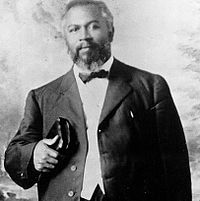William J. Seymour
William Joseph Seymour (born May 2, 1870 in Centerville , Louisiana , † September 28, 1922 in Los Angeles ) was an African American preacher and a major co-founder of the Pentecostal Azusa Street revival (1906 to 1909).
Life
Seymour was the son of Simon and Phyllis Seymour, former slaves , and was raised Baptist . The local area was shaped by the Ku Klux Klan and the segregative Jim Crow legislation.
At the age of 25 (1895) he moved to Indianapolis . At that time, only around a tenth of the colored population left the south. In Indianapolis, he joined the Simpson Chapel Methodist Episcopal Church . Because of increasing racism, Seymour moved on.
From 1900 to 1902 Seymour lived in Cincinnati , where he came into contact with Martin Wells Knapp and joined the Church of God Reformation Movement , whose views on sanctification and the outpouring of the Holy Spirit before the second coming of Jesus Christ appealed to him. He became blind in one eye from a smallpox infection. He decided to become a pastor.
In 1903 Seymour moved to Houston, Texas, where he met Charles Fox Parham , from whom he learned about baptism with the Holy Spirit and speaking in tongues .
After completing his education at the Bible School of Charles Fox Parham , Seymour began a pastor's position in Los Angeles in 1906 , but was expelled from the church after he wanted to introduce his own beliefs there.
From February 1906, Seymour began worshiping at Richard D. Asberry's private home at 214 Bonnie Brae Avenue. The believers came from very different social backgrounds.
Due to the acute lack of space, the young congregation came to 312 Azusa Street in the industrial area of Los Angeles in April 1906. They found an abandoned Methodist church that was being renovated with the active help of Christians of various denominations. There the Azusa Street Mission arose from this Azusa Street Revival movement . The Apostolic Faith , published by Seymour, had a circulation of 20,000 people starting in September 1906, and twice as many a year later.
In 1908, Seymour married Jennie Evans Moore.
Two parishioners, Clara Lum and Florence Crawford, stole Seymour's address book that year and started a rival parish in Portland, Oregon . The community center on Azusa Street could not recover from the loss of membership, the revival on Azusa Street came to an end. As a result of splits due to different beliefs (so-called Finished Work Controversy ) within the Pentecostal churches in Los Angeles, Seymour's work continued to lose importance, so that by the end of 1915 only a minority of his former followers remained in his church.
Seymour published a service order under the title The Doctrines and Discipline of the Azusa Street Apostolic Faith Mission of Los Angeles and henceforth referred to himself as a bishop . He began traveling that brought him together on various occasions with Charles Harrison Mason , founder of the Church of God in Christ , and planted various churches, some in Virginia .
On September 28, 1922, William J. Seymour died of heart failure while serving. His wife took over the leadership of the Los Angeles community. Jennie Seymour died on July 2, 1936.
Individual evidence
- ↑ Roberts Liardon: God's Generals. Why they succeeded and why some failed. Adullam, Grasbrunn 1999, ISBN 3-931484-10-6 , pp. 140f.
- ↑ Roberts Liardon: God's Generals. Why they succeeded and why some failed. Adullam, Grasbrunn 1999, ISBN 3-931484-10-6 , pp. 141f.
- ↑ Roberts Liardon: God's Generals. Why they succeeded and why some failed. Adullam, Grasbrunn 1999, ISBN 3-931484-10-6 , pp. 141f.
- ^ Randall Herbert Balmer: Seymour William J (oseph) . In: Encyclopedia of Evangelicalism . Baylor University Press, Waco 2004, ISBN 1-932792-04-X , pp. 618 (English).
- ↑ a b J. Gordon Melton: Seymour, William J. In: Encyclopedia of World Religions . Encyclopedia of Protestantism, No. 6 . Facts of File, New York 2005, ISBN 978-0-8160-5456-5 , pp. 492 (English).
- ↑ Roberts Liardon: God's Generals. Why they succeeded and why some failed. Adullam, Grasbrunn 1999, ISBN 3-931484-10-6 , pp. 143f.
- ↑ Roberts Liardon: God's Generals. Why they succeeded and why some failed. Adullam, Grasbrunn 1999, ISBN 3-931484-10-6 , pp. 145f.
- ↑ Roberts Liardon: God's Generals. Why they succeeded and why some failed. Adullam, Grasbrunn 1999, ISBN 3-931484-10-6 , pp. 147f.
- ↑ Roberts Liardon: God's Generals. Why they succeeded and why some failed. Adullam, Grasbrunn 1999, ISBN 3-931484-10-6 , pp. 162f.
| personal data | |
|---|---|
| SURNAME | Seymour, William J. |
| ALTERNATIVE NAMES | Seymour, William Joseph (full name) |
| BRIEF DESCRIPTION | American preacher, leader of the Azusa Street Revival, pioneer of the Pentecostal movement |
| DATE OF BIRTH | May 2, 1870 |
| PLACE OF BIRTH | Centerville , Louisiana |
| DATE OF DEATH | September 28, 1922 |
| Place of death | los Angeles |
